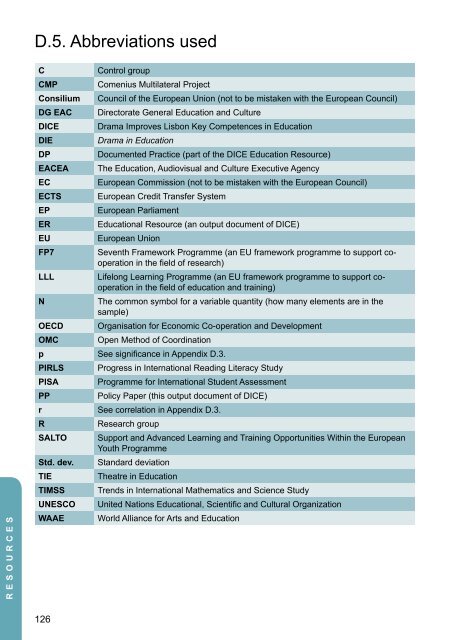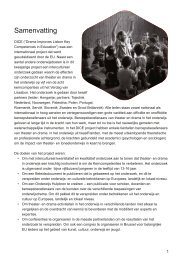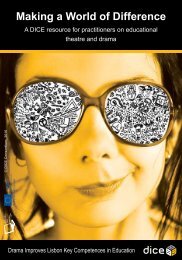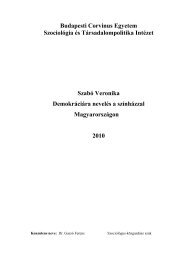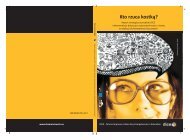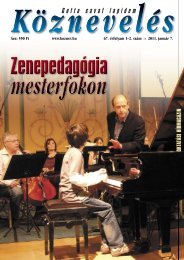Policy Paper - Drama Improves Lisbon Key Competences in Education
Policy Paper - Drama Improves Lisbon Key Competences in Education
Policy Paper - Drama Improves Lisbon Key Competences in Education
You also want an ePaper? Increase the reach of your titles
YUMPU automatically turns print PDFs into web optimized ePapers that Google loves.
D.5. Abbreviations used<br />
D.6. Tables and charts<br />
REsources<br />
C<br />
CMP<br />
Consilium<br />
DG EAC<br />
DICE<br />
DIE<br />
DP<br />
EACEA<br />
EC<br />
ECTS<br />
EP<br />
ER<br />
EU<br />
FP7<br />
LLL<br />
N<br />
OECD<br />
OMC<br />
p<br />
PIRLS<br />
PISA<br />
PP<br />
r<br />
R<br />
SALTO<br />
Std. dev.<br />
TIE<br />
TIMSS<br />
UNESCO<br />
WAAE<br />
Control group<br />
Comenius Multilateral Project<br />
Council of the European Union (not to be mistaken with the European Council)<br />
Directorate General <strong>Education</strong> and Culture<br />
<strong>Drama</strong> <strong>Improves</strong> <strong>Lisbon</strong> <strong>Key</strong> <strong>Competences</strong> <strong>in</strong> <strong>Education</strong><br />
<strong>Drama</strong> <strong>in</strong> <strong>Education</strong><br />
Documented Practice (part of the DICE <strong>Education</strong> Resource)<br />
The <strong>Education</strong>, Audiovisual and Culture Executive Agency<br />
European Commission (not to be mistaken with the European Council)<br />
European Credit Transfer System<br />
European Parliament<br />
<strong>Education</strong>al Resource (an output document of DICE)<br />
European Union<br />
Seventh Framework Programme (an EU framework programme to support cooperation<br />
<strong>in</strong> the field of research)<br />
Lifelong Learn<strong>in</strong>g Programme (an EU framework programme to support cooperation<br />
<strong>in</strong> the field of education and tra<strong>in</strong><strong>in</strong>g)<br />
The common symbol for a variable quantity (how many elements are <strong>in</strong> the<br />
sample)<br />
Organisation for Economic Co-operation and Development<br />
Open Method of Coord<strong>in</strong>ation<br />
See significance <strong>in</strong> Appendix D.3.<br />
Progress <strong>in</strong> International Read<strong>in</strong>g Literacy Study<br />
Programme for International Student Assessment<br />
<strong>Policy</strong> <strong>Paper</strong> (this output document of DICE)<br />
See correlation <strong>in</strong> Appendix D.3.<br />
Research group<br />
Support and Advanced Learn<strong>in</strong>g and Tra<strong>in</strong><strong>in</strong>g Opportunities With<strong>in</strong> the European<br />
Youth Programme<br />
Standard deviation<br />
Theatre <strong>in</strong> <strong>Education</strong><br />
Trends <strong>in</strong> International Mathematics and Science Study<br />
United Nations <strong>Education</strong>al, Scientific and Cultural Organization<br />
World Alliance for Arts and <strong>Education</strong><br />
Tables<br />
Table 1. Students who regularly participate <strong>in</strong><br />
educational theatre and drama activities<br />
compared with those who do not, accord<strong>in</strong>g<br />
to key competence “Communication <strong>in</strong> the<br />
mother tongue”<br />
Table 2. Students who regularly participate <strong>in</strong><br />
educational theatre and drama activities<br />
compared with those who do not, accord<strong>in</strong>g<br />
to key competence “Learn<strong>in</strong>g to learn”<br />
Table 3. Students who regularly participate <strong>in</strong><br />
educational theatre and drama activities<br />
compared with those who do not, accord<strong>in</strong>g<br />
to key competence “Interpersonal,<br />
<strong>in</strong>tercultural and social competences and<br />
civic competence”<br />
Table 4. Students who regularly participate <strong>in</strong><br />
educational theatre and drama activities<br />
compared with those who do not, accord<strong>in</strong>g<br />
to key competence “Entrepreneurship”<br />
Table 5.. Students who regularly participate <strong>in</strong><br />
educational theatre and drama activities<br />
compared with those who do not, accord<strong>in</strong>g<br />
to key competence “Cultural expression”<br />
Table 6. Comparison of daily activities of students<br />
who regularly participate <strong>in</strong> educational<br />
theatre and drama programmes and<br />
students who do not<br />
Table 7. Students who regularly participate <strong>in</strong><br />
educational theatre and drama activities<br />
compared with those who do not, accord<strong>in</strong>g<br />
to the assessment of their teachers on five<br />
key competences<br />
Table 8. Input/output differences between the<br />
research group (who have participated <strong>in</strong><br />
educational theatre and drama activities)<br />
and the control group (who have not),<br />
accord<strong>in</strong>g to the assessment of their<br />
teachers on five key competences<br />
Table 9. Observation clusters<br />
Table 10. Characteristics of previous research results<br />
vs. drama descriptions analysis <strong>in</strong> DICE<br />
Table 11. Themes common <strong>in</strong> all drama descriptions<br />
Table 12. The appearance of the ma<strong>in</strong> topics (see<br />
above) by countries (X: the topic appeared,<br />
it does not refer to the frequency of<br />
appearance)<br />
Table 13. Specific examples of ma<strong>in</strong> aims, focuses<br />
and methods of educational theatre and<br />
drama work by country (based on the<br />
submitted drama descriptions)<br />
Table 14. Ma<strong>in</strong> aims appear<strong>in</strong>g <strong>in</strong> nearly all drama<br />
descriptions - and the characteristics of<br />
children as described by educational theatre<br />
and drama practitioners themselves<br />
Table 15. <strong>Drama</strong> description clusters<br />
Table 16. Teacher assessment clusters<br />
Table 17. Factors that prognosticate a more effective<br />
educational theatre and drama programme<br />
Table 18.The description of the competence<br />
“Entrepreneurship”<br />
Table 19. Summary of the results of the qualitative<br />
research on competence “Entrepreneurship”<br />
Table 20. Examples of supportive factors / obstructive<br />
factors by country<br />
Table 21. Prestige of theatre and drama educators<br />
and of educational theatre and drama <strong>in</strong><br />
society<br />
Table 22. Recommendations for education,<br />
municipalities and EU policies <strong>in</strong> support<strong>in</strong>g<br />
the development of educational theatre<br />
and drama, and the frequency of their<br />
appearance <strong>in</strong> the experts’ survey<br />
resources<br />
126<br />
127


